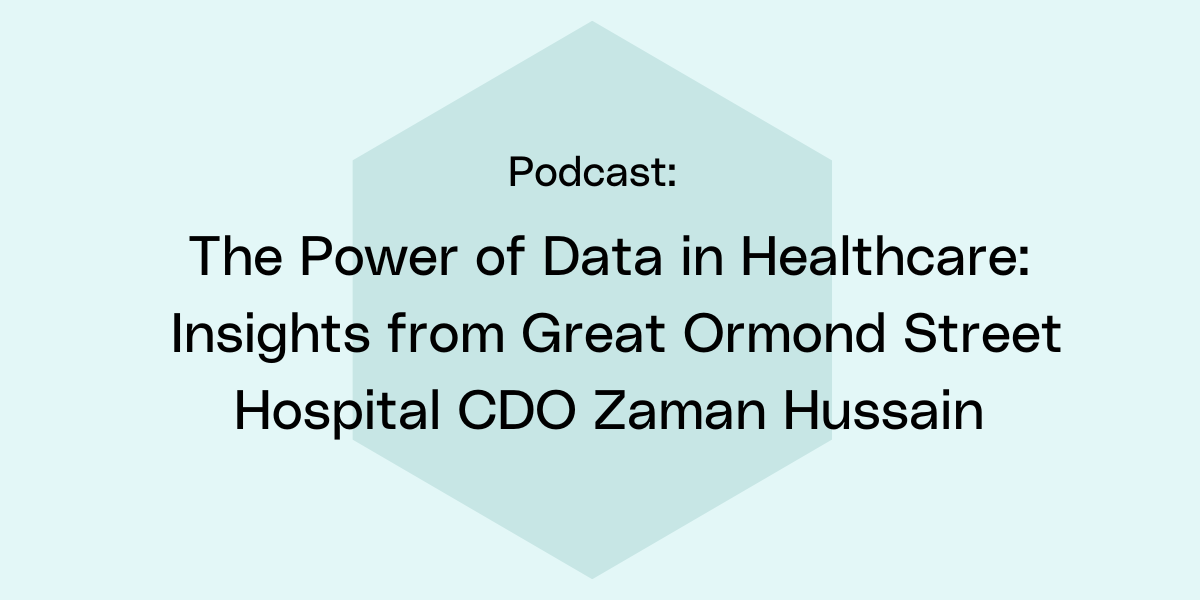Simply reporting on numbers is just scratching the surface. To unlock the true power of data in healthcare, ask yourself: What is data really telling me?
In the world of data, simply reporting on facts and numbers is just scratching the surface. If you want to unlock the true power of data in healthcare, you need to dig deeper and ask yourself: What is data really telling me?
We recently had the pleasure of speaking with Zaman Hussain, Chief Data Officer at Great Ormond Street Hospital, who offered fascinating insights on this very topic.
In today’s post, we’re exploring the role of data, how it’s transforming healthcare, and how to use it effectively. Let’s dive in!
The Role of Data in Healthcare for Patient Outcomes
Knowledge is power, and data is the key to unlocking that knowledge, especially in healthcare. One of the most significant advantages of data in this sector is the ability to impact patient outcomes.
From a business perspective, data plays a big role in improving operational efficiency. But in healthcare, its impact goes much deeper—carrying far greater responsibility and higher stakes.
As Zaman says,
“Thinking about it from a healthcare perspective, when I first joined [the hospital], I was working as an analyst and looking at the numbers, the stats and really with the view of ‘How can we improve what we already do?’ So we see 20 patients; what would it take to see 25 patients? What is the data telling us? [...] Really getting into the stories behind the data.”
He further emphasises the unique role of data in healthcare:
“Our commodity, if you like, which is different to other organisations and other industries, is not necessarily about sales or such, or things that you build and you’re going to sell or services that you’re going to develop. Our commodity is actually not about the money, but it’s all about the patient outcome.”
So, the true measure of a healthcare organisation’s success lies in how well it improves patient health. By digging into the right data, healthcare providers can uncover gaps in care, focus on areas that need improvements, and ultimately deliver better outcomes for patients.
The Challenge of Data Overload
Hospitals generate an immense volume of data daily. While data is an incredibly powerful tool, its sheer volume can quickly become overwhelming. As Zaman says,
"Sometimes it feels like there’s too much data, and you can’t see the forest for the trees.”
The challenge is to extract value from this overload. To do so, it’s crucial to focus on the most impactful metrics—the data points that truly matter and that drive impact. As Zaman explains, the metrics that drive success in healthcare are distinct from those in the private sector, with a much narrower focus.
At Great Ormond Street Hospital, the key metrics they use to check the success of patient outcomes are deeply tied to their mission.
For instance, Zaman notes,
“One of the things we look at, as a children’s organisation, we say, ‘Here’s how many operations we do, and here are the outcomes for our patients’. So you can look at life expectancy, health outcomes, once a child’s had an operation, when you compare us to other organisations, what does that look like? [...] Another key metric that we have is how quickly we see patients [...] so essentially, by the time we get that referral, how quickly do we see you?”
Proactive Ways to Use Data for Impact
To truly leverage the power of data, it’s important to adopt proactive strategies, not just retroactive ones, to improve patient outcomes. Zaman shared a few essential approaches that their organisation takes.
- Triangulating Data: Combining multiple data sources to create a clearer, more accurate picture of patient care. By cross-referencing different datasets, hospitals can identify trends, spot anomalies, and prevent issues proactively.
- Natural Language Processing: Advanced technologies like NLP allow them to extract relevant information from unstructured data, such as physician notes or patient feedback. This not only improves efficiency but also frees up valuable time for doctors to focus on patient care.
- Data Quality Infrastructure: Effective data use is anchored in data quality. For healthcare organisations, this means implementing processes to ensure the accuracy and reliability of their data. This helps ensure decisions are based on trustworthy information, leading to better patient outcomes.
Turning Data into Better Patient Care
The future of healthcare lies in data, and the possibilities are endless. As Zaman reminds us, the ultimate goal of data in healthcare is improving patient outcomes.
With a proactive approach, clear motivation, and data-driven decision-making, experts like him are transforming the way healthcare operates—ensuring better care, efficiency, and impact where it matters most.
Be sure to tune into the full episode of Data & AI Mastery for more valuable insights from Zaman on transforming healthcare through data and AI.

